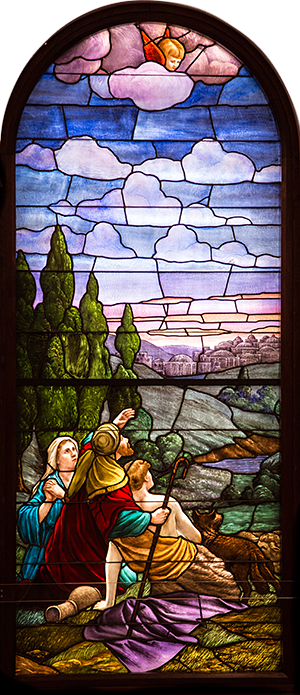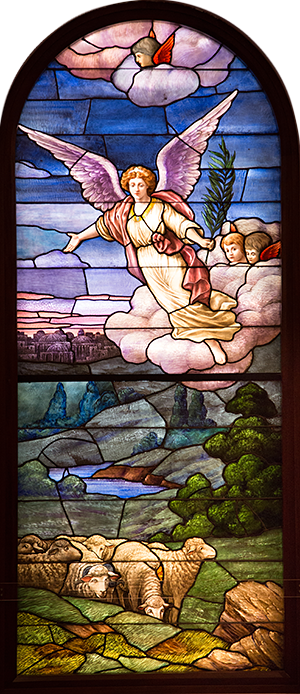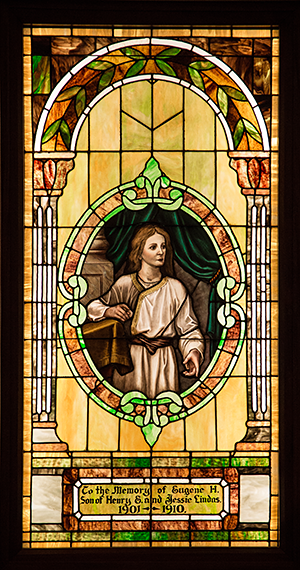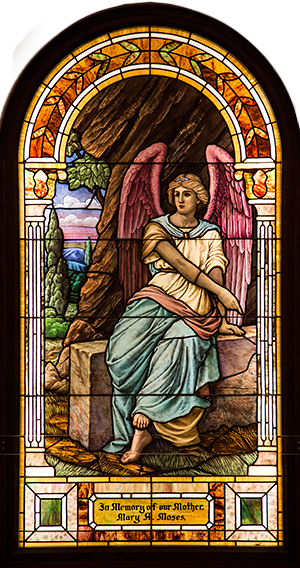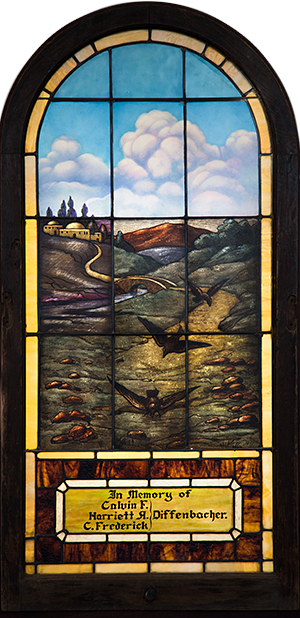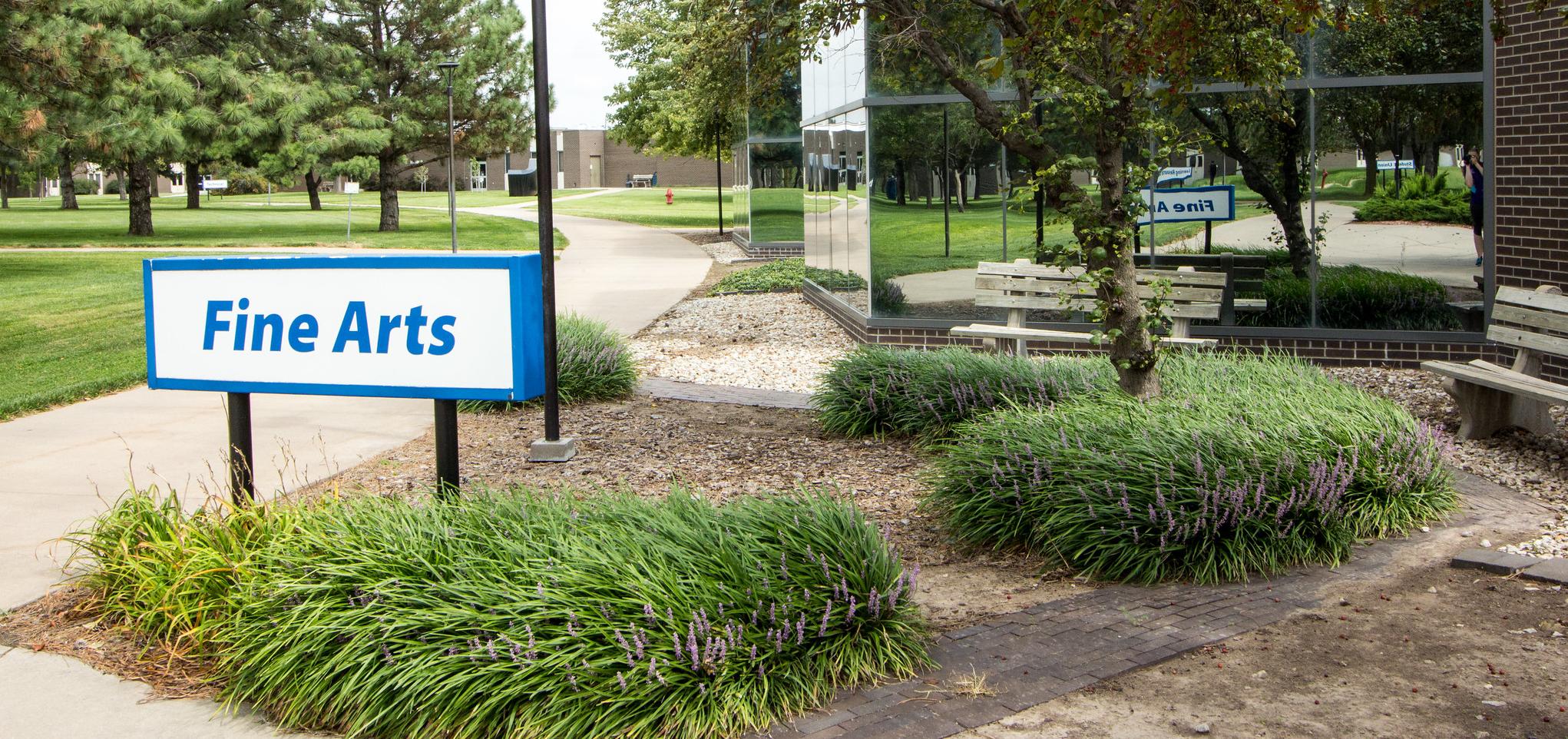
Dorothy Moses Morrison Chapel
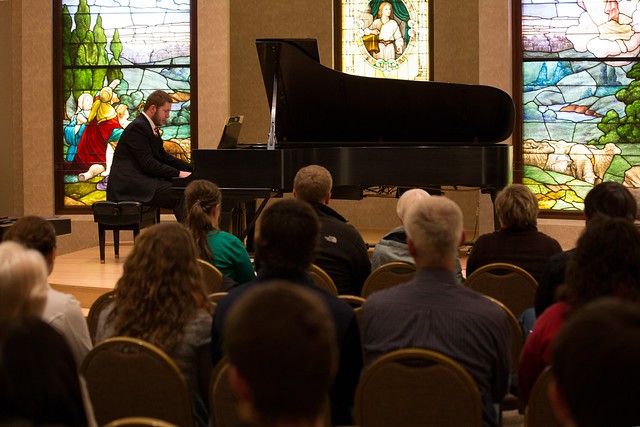 The Dorothy Moses Morrison Chapel is a showcase for five historic stained glass windows donated in 1991 by Mrs. Morrison. The windows were restored in 2001 and placed in the renovated chapel. The room is equipped with an organ, upright piano, and Steinway grand piano.
The Dorothy Moses Morrison Chapel is a showcase for five historic stained glass windows donated in 1991 by Mrs. Morrison. The windows were restored in 2001 and placed in the renovated chapel. The room is equipped with an organ, upright piano, and Steinway grand piano.
The intimate space has become a popular setting for solo recitals, small chamber groups and public performances. It also serves as the Choral Room for the Barton Music Department.
Find more detailed information on each window.
Public Use
Members of the public can rent the chapel for events, such as small weddings or performances.
Four hours or less - $100
More than four hours - $165 (per day)
To reserve the Chapel, call (620) 792-9340, or send an email.
Free Tours
Tours of the chapel are free and available by appointment. Call the Shafer Gallery at (620) 792-9342 to schedule a tour.
The First Congregational Church in Great Bend, Kansas dedicated their first building in 1879. The congregation continued to grow, and a new brick building was begun in May 1910. This new structure, finished in March 1911, cost $30,000 and included a new pipe organ.
In this new building were a large number of stained glass windows, many of which served as memorials to prominent church and community members.
By 1959 the church had again outgrown its facilities. After a new building was constructed at 21st and Polk in Great Bend, the windows from the old church were removed and sold or placed in storage.
In 1991, Dorothy Moses Morrison, great-granddaughter of one of the founding members of the congregation, donated five of these windows as a gift to the Barton Community College Foundation. The windows were restored in 2001, and then installed in the renovated chapel, which was renamed in her honor.
Amasa C. and Naomi A. (Terry Moses) were the parents of seven sons who grew to maturity in Great Bend. With the help of their father, these men contributed greatly to the growth of Great Bend in milling and banking. Upon the decision to build a new church, the sons supported the creation of a stained glass diptych in memory of their parents because of their influence in starting the Congregational Church. The couple were charter members of the church. Additionally, A.C. was the first superintendent of the Sunday school.
This small rectangular window depicting the young Christ is dedicated to the memory of Eugene H. Lindas. Lindas was the eight-year-old son of Dr. Henry and Jessie Lindas of Great Bend and the grandson of John Lindas, an early settler of Pawnee Rock, then of Larned, and proprietor of Lindas Lumber Company. In 1910, Eugene Lindas drowned while playing with friends in the Arkansas River, south of Great Bend. He was three months shy of his ninth birthday.
The sons of Mary A. Moses purchased a stained glass window in memory of their mother who raised fourteen children. Moses' son, George, was Barton County's first sheriff, while another son, Edward, ran a successful mercantile business. A daughter, Laura, married C.P. Townsley, founder of the Inland Tribune, who also was a lawyer and judge. Another window, dedicated to the memory of Judge Townsley is displayed in the foyer of the present First Congregational United Church of Christ.
Calvin Follmer Diffenbacher was born April 5, 1835, in Pennsylvania and came to Great Bend in 1873, one year after the town was formed. His wife and children followed him one year later. He was a legal partner with G. W. Nimocks and also D. A. Banta until 1896. He was elected mayor of Great Bend in 1876 and to the board of education in 1889 and served two terms. He also held the office of county attorney, was a delegate to the convention that named William Jennings Bryan the first time for the presidency. Mr. Diffenbacher died Mar. 20, 1907. He married Harriet Amelia Smith (Jan 18, 1841 to May 18, 1909) September 1, 1859 at Arenzville, Illinois, they were the parents of seven children. Their son, Calvin Frederick Diffenbacher was born Feb. 25, 1873 in Illinois and died of malignant typhoid Aug. 11, 1890 in Great Bend. He was laid to rest in the Great Bend Cemetery where his parents were both later buried.
